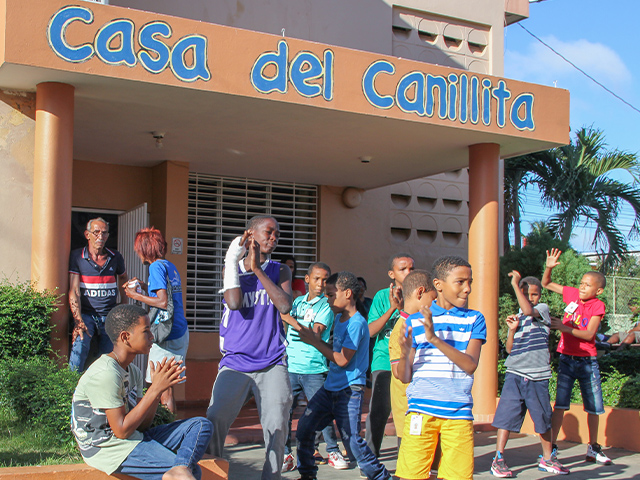DOMINICAN REPUBLIC: Documentary focuses on Salesian work against child labor

Plight of 6 children featured, along with Salesian organization
(MissionNewswire) The new documentary “Canillitas” is giving a voice to the more than 340,000 children working in the Dominican Republic, according to an article in Vatican News. The documentary is focused on the plight of six children, the Salesian organization Canillitas con Don Bosco, the founder of the program and the educators who support the children.
Alberto López Herrero, producer, explained the meaning of the word canillitas, which is a name for children who try to earn a living for themselves and their families by moving “las canillas”, or their legs, in many Latin American countries. He told Vatican News, “We make a documentary every two years set in a different country of the world to inform, denounce and raise awareness about a particular violated right of childhood. This word also gave its name to the first Salesian project launched in the Dominican Republic, which will soon be 38 years old.”
López explained to Vatican News that when most people think of child labor they think of factories in India or mines in Colombia but it’s an issue closer than most believe. He noted, “Even in our wrongly defined developed world, there are situations of child labor. Many children, including migrants, are subjected to this type of exploitation, sometimes finding themselves in a condition of slavery.”
Moisés is one of the children featured in the documentary. He recounted that from 8 a.m. to 7 p.m on Saturdays and Sundays, he would walk around the streets of his neighborhood, La Ciénaga, carrying a wooden crate on his shoulders with the products he needed to be a shoe-shiner.
He told Vatican News, “I really enjoyed making the documentary because it tells who I am, what I have lived, how I live, where I live and how I clean shoes.” Moisés does the work to help his grandmother and his mother buy things for the house. He has big dreams for when he gets older thinking about becoming an artist or a lawyer, changing from his initial desire to become a doctor.
Father Juan Linares, Salesian missionary in Santo Domingo, started the program in 1985 when there were 500,000 children working, according to Vatican News. Even though the number has decreased, there is still much work to be done. The goal is to make the children’s plight as public as possible to gain support for the children and the services that protect them.
Fr. Linares is coordinating the work with children living and working on the streets. “Every morning these children went out into the streets to sell their produce and we devised an accompaniment plan for them, especially with a view to their full development for the future. First, we got to know their reality, where they lived and what they did. We also studied the level of schooling as a primary element in order to set up an integral project based on research, reception, socialization and accompaniment. This was our experience, which was then replicated in other centers.”
The work is not always easy. Karen Montàs, director of Canillitas con Don Bosco, indicated that getting family acceptance is a challenge. Participating in the program means fewer hours working, impacting the family’s overall income.
“That is why, we first had to make them understand that children should not be on the street working but studying and that it is the adults who should take responsibility for supporting the family,” said Montàs in the article. “They feel the need to help their families by going to work so we have to occupy their free time after school with art courses and sports activities. Finally, it is not easy to find the resources to make the project sustainable.”
The program also helps adults gain news skills so they can find better, higher-paying employment so children do not have to work. Montàs explained, “It is necessary to educate people and children so that they do not remain in situations of poverty. It is also necessary to work with society so that employers do not hire children because it is cheaper. Finally, we need to pass targeted laws because child labor can be eradicated with public policies that guarantee basic rights to children.”
Nearly half of youth under the age of 18 live in poverty in the Dominican Republic, according to UNICEF. Although the country’s economy has been steadily improving, the country’s poor people still struggle to get enough food to eat and to access safe drinking water and adequate housing. Only 30% of youth finish primary school and only 18% finish secondary school on time. Schools are in poor shape with nearly half having no access to safe drinking water and more than 60% lacking adequate bathroom facilities.
###
Sources:
Photo courtesy of Misiones Salesianas
UNICEF – Dominican Republic
Vatican News – “Canillitas”: The Salesian documentary that gives voice to exploited children





